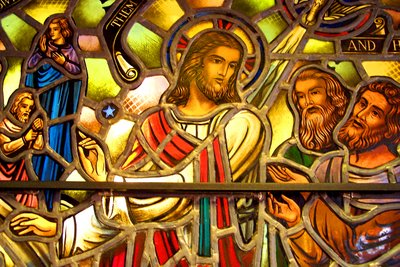
A while back, I wrote about translating the Lord's Prayer into the Salish language. Today I'm still thinking about the Indian words used to describe the new forms of spirituality introduced by the Christian missionaries.
Back in 1958, Father Thomas Connolly transcribed and edited a book of Salish hymns and prayers titled, "Quay-lem u En-chow-men: A Collection of Hymns and Prayers in the Flathead-Kalispel-Spokane Indian Language." The Salish title literally means "Songs and Prayers."
As I recently reviewed the title page and table of contents, I noticed for the first time, a list of Latin phrases followed by names: Imprimi Potest, Nihil Obstat, Censor Liborum, and Imprimatur (by Bernard J. Topel, Bishop of Spokane). I'm no expert in Catholic laws and procedures, but the presence of these letters would suggest that our Salish prayer book followed a formal process of approval within the Catholic Church. According to the American Catholic website:
"Imprimatur is Latin for 'let it be printed.' When a Roman Catholic bishop grants his imprimatur to a printed work, he assures the reader that nothing therein is contrary to Catholic faith or morals. This imprimatur is not given lightly; only after a thorough review process."
This is heavy. I never imagined our little prayer book had endured such a rigorous process of approval. What implication might this hold for my previous discussion of doctinal differences between the Salish and English? I'm looking to my Catholic scholars for some input here.
Here's another example of a hymn:

Good Jesus,
Good Jesus,
You are my Savior (Lifegiver).
Take pity on me.
Take pity on me.
I will love you.
I will love you.
Once again, the differences are subtle.
Jesus is called good, but not holy. As far as I can tell, no concept of holiness exists in the Salish language.
Jesus is also called a Savior in this hymn, but the Salish word is slightly different. The root word "xwlxwilt" refers to something living or alive. By adding the suffix "cut" the word becomes reflexive, meaning that life is being given or created to oneself. In other words, Jesus might be described as the "One who gives life to himself." Presumably, he may choose to also grant his life to others. The Salish version would seem consistent with the Christian notion of Jesus as Creator or Lifegiver, but not necessarily as one who saves from an invisble fall. The Christian notion of the fall seems largely absent from Salish theology.
The hymn also declares, "I will love you, I will love you."
The word xmench is problematic on several levels. It's true that many people still use this word to describe love, but some argument exists regarding its true meaning. Others claim the word simply refers to one's preference or "like." Unfortunately, "I will like you, I will like you," doesn't have the same poetic resonance. I've never fully resolved this meaning in my own mind, but I am clear that love/like do not mean the same in Salish as they do in English.
4 comments:
That formal process of getting the Nihil Obstat and Imprimatur is standard for any Catholic publishing on faith and morals. Basically, it is a guarantee that the book is free from doctrinal errors.
But even in Latin, there are references to "good Jesus". "O Bone Jesu" is a song in Latin, the title means "O Good Jesus".
What you describe I wouldn't call a doctrinal difference. The Catholic faith isn't taught in a vacuum. The missionaries would have explained in detail what they were talking about.
You're probably right. The "doctrinal" differences are probably quite small, but the underlying cultural connotations are very different. In fact, I maintain that these subtle differences eventually had a cumulative effect and may have strained Indian-Catholic relations.
Many of our Indian ancestors enthusiastically embraced Catholicism in the beginning, but when they later discovered that the words meant something different, their excitement diminished. Our Salish religion was based on the accumulation of spirit "helpers" or powers. In the beginning, they gladly added Jesus as one among many powers. But when they eventually understood the exclusivity implied by the church, many returned to their old religions.
Even today, many of my relatives maintain affiliation with Catholicism, but mainly practice the old Indian ways. It might be typified by the previous discussion regarding chieftainships versus kingdoms. For many, Jesus is a chief to be honored, respected, and even consulted, but not a king to be obeyed to the exclusion of our ancient teachings.
I'm not saying one way is right and the other wrong. Im simply saying that the power of word differences is often greater than we may know.
Barry:
Great post and site. Lémlmtš.
The word inxʷlxʷlcútn combines several suffixes: reflective –cút (from transitive and reflexive //-t-sut//) plus an unstressed instrumental suffix //-tin//, reduced to –n in this combination. The force of those suffixes together means 'one who does s.t. with respect to the person.' For instance, k'ʷl'ncútn is often used for "God." The root k'ʷul' means 'make,' k'ʷl'ncútn does not mean "one who created himself" but "one's creator." The one who created one. It is a bit abstract in the third person. When one adds the first person pronominal prefix, //-in//, it is easier to see: ink'ʷl'ncútn, 'my Creator'—the one who created me. There are many words in the language formed with the –cútn suffix combination.
I hope that helps with your search.
kʷ isl'áx̣t
P.S. Copy this into word. Block it and convert it into Lucida Sans Unicode. Then you can read the IPA symbols.
lemlmtš i sl’axt. stem’ a skʷest (swet łu a skʷest). kʷ tl’ čen’.
Post a Comment